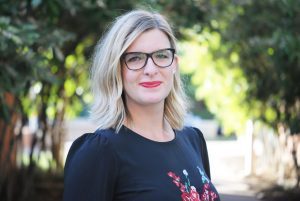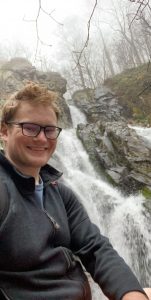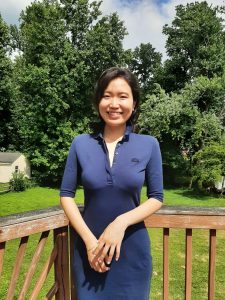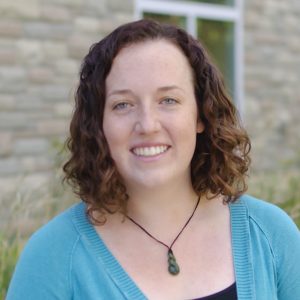Department Awards
Striving for Excellence
The Department of Biochemistry & Molecular Genetics has a long standing reputation for excellence amongst its faculty, staff, and students. Awards received represent outstanding achievement, performance, and/or research from dedicated individuals who strive for perfection in their respective fields.
Congratulations to all award recipients!
Awards
Congratulations to Jose Verdezoto Mosquera in Clint Miller’s Lab for winning the 2025 Outstanding BMG Student Award.
Jose is also our BMG nominee for the BIMS Peach and Hungerford Awards, which will be announced at the GBS Symposium.
 Assistant to the Chair of the Department of Biochemistry and Molecular Genetics
Assistant to the Chair of the Department of Biochemistry and Molecular Genetics
The School of Medicine is pleased to congratulate Sandra Burks, Fisher Rhoads, and Nancy Rush, for receiving the 2024 Leonard W. Sandridge Outstanding Contributor Award in early December. They are among 11 UVA Health and Academic Division employees honored.
The Leonard W. Sandridge Outstanding Contributor Award is the highest individual employee award at the University, named in honor of Leonard W. Sandridge — an avid champion of UVA staff who dedicated 44 years of service to UVA. This award recognizes an outstanding University staff or team member who demonstrates dedication to service through individual efforts, group contributions, and commitment to our larger community.
23 Years Strong, U.Va.’s SRIP Helps Undergrad
Biomedical Students Focus on Future
August 5, 2014
This weekend, 30 students who called the Bice House their home this summer packed their suitcases, loaded their cars and prepared to head home. Selected from a pool of 715 applicants from across the country, they had just wrapped up their work at the University of Virginia School of Medicine’s Summer Research Internship Program.
Abbreviated “SRIP,” the program has been recognized by the National Institutes of Health as one of the best undergraduate biomedical research programs in the country – and for many, it’s a defining point in determining their career in the sciences.
Back when the program started in 1992, program director Joel Hockensmith and coordinator Jeff Baker had just enough funding to offer four students an internship with a medical school faculty member.
Now, due to the program’s huge success, they’re able to accept more than two dozen students into labs at U.Va. to conduct supervised research based on their interests. The program has three components: the faculty mentorship, a series of workshops based in different facets of biomedical research and a lecture series in which students hear from internationally recognized scientists. They learn from professionals in cardiology, genome mapping, neuroscience and more, receive free GRE tutoring and hear from graduate students who walked in their shoes only a couple years earlier.
“We’re trying to help students see diverse perspectives,” said Hockensmith, an associate professor of biochemistry and molecular genetics. “All the students are smart, but they don’t all have the same passions, so we read the apps to figure out who has passion. Some of them don’t know for sure what they want to do, but if we can get them here and inflame their passion, it’s fantastic.”
After more than two decades, 33 percent of SRIP graduates have gone on to seek their Ph.D., while 32 percent will pursue their M.D. The rest have used their medical knowledge in other fields like law or public service. In all, more than 80 percent go on to graduate study – weighty numbers compared to similar summer programs. “Peer review says if you stack up the dozen universities that send applications to the National Institutes of Health to get their grants funded, U.Va.’s outcomes push them to the top,” Hockensmith said. “SRIP provided me an opportunity to decide that a career in science was the right choice for me,” said Awndre Gamache, who was accepted into the program in 2010 from Washington State University and subsequently was accepted into U.Va.’s microbiology, immunology and cancer biology program to pursue his Ph.D. “”Even if I made an alternate career choice, I still would have considered the program a huge success because it offers an accurate representation of careers in science.”
The program targets, but is not limited to, racial and ethnic minority students in their junior and senior years. While many colleges have diversity programs, word quickly grew about the U.Va.’s program because of the relative success of its students. “I used to have to call up [historically black] colleges like Hampton [University] and pitch the program, but now it’s the other way around,” Hockensmith said. For Crystal Richardson, a former SRIP intern now pursuing her Ph.D. in the U.Va. Medical School’s cell biology department, the program exposed her to what graduate research was all about. “Since I went to a small liberal arts college, it was very exciting to have the new experience of working in a much larger research university,” she said. “There were no graduate programs at my undergrad, so SRIP allowed me to meet and work with graduate students. This helped me to understand what graduate students do when working toward a PhD, which is hypothesis-driven research.”
Fifty-one alumni have a Ph.D., and 10 are currently professors. More than 200 have published professional papers, some stemming directly from their SRIP research, yielding a total of more than 750 peer-reviewed publications. “What we find is if students make a good decision and bring passion, they’re much more productive in their research and in their careers,” Hockensmith said. “That is very important to us – we have a vested interest in making sure our students succeed, so we work very hard to give them the tools.”
Congratulations to Budha Banerjee, Ph.D., a post-doc in the McConnell Lab, who received runner-up recognition for his poster “Establishing an hiPSC model for the study of brain mosaicism” at the annual meeting of the New York Stem Cell Foundation.
Chelsi Snow (Paschal Lab) was the BMG Outstanding Graduate Student awardee and therefore the nominee for the BIMS-wide awards.
Chelsi is now the winner of the: 2014 Hungerford Award – https://med.virginia.edu/bims/jill-e-hungerford-prize-in-biomedical-sciences//
Madison Stellfox (Foltz Lab) GBS instituted a new award for 2014: GBS Student Leadership Award. Madison has been an active participant in the GSAS council, the First Harmonics (UVA’s Only Graduate Science and Engineering A Cappella Group), The Raven Society (UVa Honor Society) as well as serving as a Judge for the University Judiciary Council and contributor to numerous other activities.
Congratulations to Sabrina Nuñez, PhD, Assistant Professor of Medical Education, Office of Undergraduate Medical Education & Department of Biochemistry and Molecular Genetics, on receiving the Alpha Omega Alpha – Anne L. Brodie Teacher’s Teacher Award for excellence in mentoring clinical educators.
Dr John Dent’s nomination letter opined, “Dr Nunez is an incredibly capable educator and collaborator in the Medical School, one of the best I have seen in my nearly 27 years here. What really sets her apart is her ability to increase the efficacy of other teachers.”
Dr. Neeral Shaw added, “…Dr Nunez has the magic touch…. She has helped many faculty members, including myself, to visualize the educational sessions from the learner’s point of view. She has helped take faculty who have been teaching 20-30 years and given them new invigorated enthusiasm to embrace these new active learning techniques.”
Dr. Nuñez says, “This award is a testament to the collaboration that underlies effective teaching. My contribution is only valuable in the context of a team of passionate educators!”
As part of her nomination, Dr. Nuñez wrote a personal reflection. In it, she wrote, “It is extremely flattering to be receiving this nomination for my role in this success. Credit belongs to all of us collectively though, and I am certain I have learnt as much from them as they have from me.”
The Alpha Omega Alpha – Anne L Brodie Teacher’s Teacher Award is an annual award intended to recognize University of Virginia School of Medicine faculty who model excellence in mentoring clinical educators. Please join us in congratulating Dr. Nuñez on this outstanding honor.
Evan Heald M.D.
Brodie Medical Education Committee Director

What her nominator says: “She has snatched victory from potential chaos and given our future physicians an educational experience that is unprecedented at U.Va.”
What her colleagues say: “She inspires medical students to want to learn (because she shows them how much she cares about their success) and faculty to want to be the very best educators they can be, while shying away from the spotlight and working effectively behind the scenes.”
What her students say: “For many of us, trying to understand how glycolysis, the TCA cycle, purine degradation, etc. fit together in the context of human health and disease was proving to be an almost Herculean task. Noramly took a subject great and mysterious in itself, and unfolded it and simplified it so we could understand it.”
What she says: “Always the understanding of the bigger picture drives me. I believe a holistic view of the student creates the most successful learning interactions. It may behoove one to memorize enzymes and the minutiae of their functional regulation, but only in the larger context – otherwise, no understanding can occur.”
Usnish Majumdar an undergraduate student in the McConnell lab is a recipient of the 2015 Harrison Award for his project entitled “Retrotransposition and DNA double-strand breaks in a hiPSC-derived model of neurogenesis.”
BMG is delighted to celebrate Jiekun (Jackie) Yang as the 2016 BMG Outstanding Graduate Student Award recipient. Jackie is thriving in her bioinformatics studies with two first-author publications. She is looking forward to finishing her Ph.D. in the upcoming months with a crowning achievement of a third publication in the high impact journal Molecular Psychiatry.
Jackie Yang is a current graduate student in the lab of Dr. Stephen Rich.
Congratulations to Rebecca (Becky) Wilson on behalf of the ASBMB for her award winning thematic best poster on Protein Synthesis and Degradation. Rebecca’s poster was selected by the Program Planning Committee at the recent ASBMB meeting in San Diego, California. Her abstract entitled: “ULK1-Mediated Autophagy is Required for Skeletal Muscle Recovery From Acute Ischemia-Reperfusion Injury” was selected from theme organizers as an outstanding research presentation.
Rebecca is a graduate student in the lab of Dr. Zhen Yan. She is on a CVRC training grant and now has been awarded an AHA pre-doctoral fellowship.
Magda Cichewicz has been selected as the 2017 BMG Outstanding Graduate Student! Congratulations!!
With this award, her nomination will be advanced to compete for the Peach and Hungerford awards which will be announced at the annual GBS symposium. Magda is a Graduate Student in the lab of Dr. Anindya Dutta.

Congratulations to Krystina Kupova, a graduate student in the lab of Dr. David Auble, for being selected for a 2021 Wagner Fellowship. The history of the Wagner Fellowship is below:
In 1997, Bob and Mary Wagner established The Robert R. Wagner Fellowship Fund with the goal of providing fellowships to graduate students in the basic sciences in the School of Medicine. Among Dr. Wagner’s notable contributions to UVA include his service as the first Chair of the Department of Microbiology and as the founding Director of the UVA Cancer Center. Mrs. Wagner began her generous support of graduate students soon after Dr. Wagner’s death in 2001. The Fellowship endowment became fully funded after Mrs. Wagner’s death in 2013 and is currently valued at approximately $5.3M. This incredible investment in the Biomedical Sciences Graduate Program at the University of Virginia is a lasting tribute to Dr. Wagner’s legacy.
 Congratulations to Mark Kreutzberger, a graduate student in the lab of Dr. Edward Egelman, for being selected for a 2021 Wagner Fellowship. The history of the Wagner Fellowship is below:
Congratulations to Mark Kreutzberger, a graduate student in the lab of Dr. Edward Egelman, for being selected for a 2021 Wagner Fellowship. The history of the Wagner Fellowship is below:
In 1997, Bob and Mary Wagner established The Robert R. Wagner Fellowship Fund with the goal of providing fellowships to graduate students in the basic sciences in the School of Medicine. Among Dr. Wagner’s notable contributions to UVA include his service as the first Chair of the Department of Microbiology and as the founding Director of the UVA Cancer Center. Mrs. Wagner began her generous support of graduate students soon after Dr. Wagner’s death in 2001. The Fellowship endowment became fully funded after Mrs. Wagner’s death in 2013 and is currently valued at approximately $5.3M. This incredible investment in the Biomedical Sciences Graduate Program at the University of Virginia is a lasting tribute to Dr. Wagner’s legacy.
 Congratulations to HeeJin (Kate) Cheon , a graduate student in the lab of Dr. Thomas Loughran, for being selected for a 2021 Wagner Fellowship. The history of the Wagner Fellowship is below:
Congratulations to HeeJin (Kate) Cheon , a graduate student in the lab of Dr. Thomas Loughran, for being selected for a 2021 Wagner Fellowship. The history of the Wagner Fellowship is below:
In 1997, Bob and Mary Wagner established The Robert R. Wagner Fellowship Fund with the goal of providing fellowships to graduate students in the basic sciences in the School of Medicine. Among Dr. Wagner’s notable contributions to UVA include his service as the first Chair of the Department of Microbiology and as the founding Director of the UVA Cancer Center. Mrs. Wagner began her generous support of graduate students soon after Dr. Wagner’s death in 2001. The Fellowship endowment became fully funded after Mrs. Wagner’s death in 2013 and is currently valued at approximately $5.3M. This incredible investment in the Biomedical Sciences Graduate Program at the University of Virginia is a lasting tribute to Dr. Wagner’s legacy.
 Congratulations to Heather Raimer, a graduate student in the lab of Dr. Yuh-Hwa Wang, for being selected for a 2021 Wagner Fellowship. The history of the Wagner Fellowship is below:
Congratulations to Heather Raimer, a graduate student in the lab of Dr. Yuh-Hwa Wang, for being selected for a 2021 Wagner Fellowship. The history of the Wagner Fellowship is below:
In 1997, Bob and Mary Wagner established The Robert R. Wagner Fellowship Fund with the goal of providing fellowships to graduate students in the basic sciences in the School of Medicine. Among Dr. Wagner’s notable contributions to UVA include his service as the first Chair of the Department of Microbiology and as the founding Director of the UVA Cancer Center. Mrs. Wagner began her generous support of graduate students soon after Dr. Wagner’s death in 2001. The Fellowship endowment became fully funded after Mrs. Wagner’s death in 2013 and is currently valued at approximately $5.3M. This incredible investment in the Biomedical Sciences Graduate Program at the University of Virginia is a lasting tribute to Dr. Wagner’s legacy.
Congratulations to Benjamin Morris, a graduate student in the lab of Dr. Marty Mayo, for being selected for a 2021 Wagner Fellowship. The history of the Wagner Fellowship is below:
In 1997, Bob and Mary Wagner established The Robert R. Wagner Fellowship Fund with the goal of providing fellowships to graduate students in the basic sciences in the School of Medicine. Among Dr. Wagner’s notable contributions to UVA include his service as the first Chair of the Department of Microbiology and as the founding Director of the UVA Cancer Center. Mrs. Wagner began her generous support of graduate students soon after Dr. Wagner’s death in 2001. The Fellowship endowment became fully funded after Mrs. Wagner’s death in 2013 and is currently valued at approximately $5.3M. This incredible investment in the Biomedical Sciences Graduate Program at the University of Virginia is a lasting tribute to Dr. Wagner’s legacy.
Congratulations to Basel Al-Barghouthi who has been chosen as the 2021 Hamlin Award Recipient. Basel is a graduate student in the lab of Charles Farber and set to defend this year.
Congratulations to Arun Dutta who is a 2nd place poster winner of this years GBS Symposium. Arun is an MSTP student in the lab of Dr. Michael Guertin.
Congratulations to Beth Wagner who is the 3rd place recipient of this years GBS Symposium poster award.
Beth is a Graduate Student in the Shin Lab.
Congratulations to Roza Przanowska who is this year’s recipient of the GBS Student Leadership Award.
Congratulations to Roza Przanowska who is the 2021 recipient of the BMG Outstanding Student Award. Roza has received a K99/R00 which will aid in her transition from Graduate Student to Post Doctoral Trainee.
Roza trained in the lab of Dr. Anindya Dutta.
Congratulations to Heather Raimer Young who has been chosen as the 2022 Hamlin Award Recipient. Heather is a graduate student in the laboratory of Yuh-Hwa Wang.
Congratulations to Kristyna Kupkova who is the 2022 recipient of the BMG Outstanding Student Award. Kristyna is a graduate student in the laboratories of David Auble and Nathan Sheffield.
Congratulations to Lillian Dillard who is a 2nd place poster winner of this year’s GBS Symposium. Lillian is a graduate student in the laboratory of Jason Papin.
Congratulations to Heather Raimer Young who is this year’s recipient of the GBS Student Leadership Award. Heather is a graduate student in the laboratory of Yuh-Hwa Wang.
Congratulations to Heejin Cheon who is the 2023 recipient of the BMG Outstanding Student Award.
Congratulations to Arun Dutta who has been chosen as the 2023 Hamlin Award Recipient. Arun is a graduate student in the laboratory of Michael Guertin.
Congratulations to Tommy Scott who is the 2024 recipient of the BMG Outstanding Student Award. Tommy is a graduate student and his Mentor is Dr. Michael Guertin.
